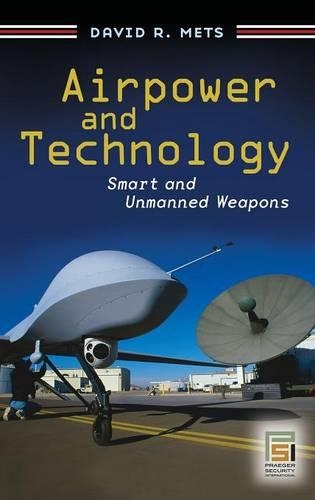
Airpower and Technology: Smart and Unmanned Weapons
(Hardback)
Publishing Details
Airpower and Technology: Smart and Unmanned Weapons
By (Author) David R. Mets
Bloomsbury Publishing PLC
Praeger Publishers Inc
30th December 2008
United States
Classifications
Tertiary Education
Non Fiction
358.4
Physical Properties
Hardback
248
Width 156mm, Height 235mm
539g
Description
Is there a reason for the busy citizen-leader to read about air and space history, theory, and doctrine Yes, asserts David Mets, because without some vision of what the future is likely to bring, we enter new conflicts unarmed with any ideas and highly vulnerable to confusion and paralysis. He wrote this book to help the aspirant American leader build a theory of war and air and space power, including an understanding of what doctrine is, and what its utility and limitations are. Since its earliest days, airpower has been one of the dominant forces used by the American military. American airmen, both Navy and Air Force, have been continually striving to achieve precision strikes in high altitude, at long range, or in darkness. The search for precision attack from standoff distances or altitudes has been imperative to national objectives with expenditure of American lives, treasure, and time. This work covers the whole history of American aviation with special attention to the development of smart weapons and unmanned aerial vehicles and the influence they have had on the effectiveness of airpower. In a chronological treatment, emphasizing theory and doctrine, technology, tactics, and strategy. Mets also details both combat experience and intellectual processes, lethal and non-lethal, involved in the preparation of airpower. In addition to the narrative discussion, the work offers sidebars and feature sections that facilitate the understanding of key weapons systems and operational challenges. It also offers A Dozen-Book Sampler for Your Reading on Air and Space Theory and Doctrine. The work concludes with a brief look at information warfare and with some speculations about the future. Through this thorough consideration of the evolution of American airpower and technology, Mets provides, not only a map of the past, but a guide to future generations of airpower and its potential for keeping the United States strong and safe.
Reviews
In a chronological treatment of the entire history of American aviation, emphasizing theory and doctrine, technology, tactics, and strategy, [Metz] details both combat experience and intellectual processes involved in the preparation of airpower. Special attention is paid to the development of smart weapons and unmanned aerial vehicles and the influence they have had on the effectiveness of airpower. In addition to the narrative discussion, sidebars explain key weapons systems and operational challenges. The book concludes with a brief look at information warfare and with speculations about the future. * SciTech Book News *
Mets covers far more than just smart and unmanned weapons, offering expert insights that contextualize all air weaponry for the lay reader. . . . Recommended. Graduate students/faculty/professionals. * Choice *
Author Bio
DAVID R. METS is Professor Emeritus, School of Advanced Air and Space Studies at the USAF Air University. He is a retired air force navigator, pilot, commander, and academy professor. He has authored four books and previously served as editor of The Air University Review.
